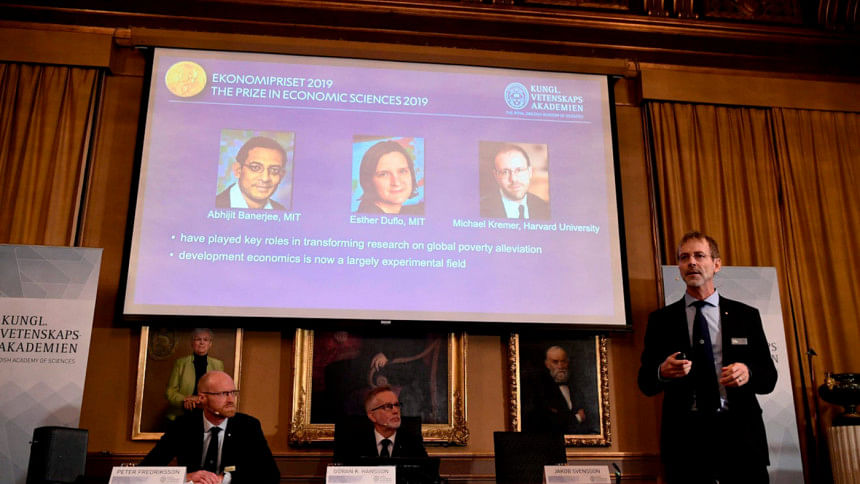The battle against privation

The 2019 Nobel Prize in Economics was awarded to a trio who came from three different continents to teach and work together in Cambridge, USA. Abhijit Banerjee hails from India, Esther Duflo grew up in France, and Michael Kremer was born and brought up in the USA and finished his undergraduate and graduate degrees at Harvard. Their research focuses on poverty alleviation, and more specifically on the design of policy to guide development practitioners and government.
All three Nobel winners believe that data and experimentation should guide efforts to ease poverty. "Nobel for Poverty's Economics" declared a banner in the New York Times on October 15, a day after the winners were announced. Banerjee and Duflo have argued in their pioneering book, "Poverty Economics" that so much of anti-poverty policy has failed over the years because of an inadequate understanding of poverty. The battle against poverty can be won, but it will take patience, careful thinking and a willingness to learn from evidence.
Kremer, Banerjee, and Duflo have devoted almost two decades in "developing new ways to study—and help—the world's poor." Their meticulous work in experimental economics offers transformative potential for poor people anywhere and is a vital guide to policymakers, philanthropists, activists and anyone else who cares about building a world without poverty.
Policymakers often search for the "silver bullet" to eliminate poverty. All three Nobel Laureates challenge the notion that there is a "miracle cure" for poverty. It is safe to assert now that studies and scientific research make it abundantly clear that poverty elimination is a complex and trial-and-error process. We tried the Grameen model of microcredit, but 30 years of experience shows that while credit does help, its role in eliminating extreme poverty is very limited. Studies conducted in many countries including Bangladesh have frequently questioned the marginal beneficiary effect of this programme on poverty.
Banerjee and Duflo established MIT's Poverty Action Lab which through its research in six countries first raised the alarm, and their results indicate that "microcredit has failed to meet its expectations." Kremer has independently discovered that interventions to address problems like education deficiencies and child health have a high cost-benefit ratio.
The Royal Swedish Academy of Sciences appeared to be gushing with excitement, so to speak when they announced that, "In just two decades, their new experiment-based approach has transformed development economics, which is now a flourishing field".
I will be remiss if I do not mention the two principles that these three practitioners of economics have popularised in their search for new options to fight poverty. First, all potential and promising actions must be assessed for efficacy before they are mass-produced or "replicated." Secondly, Poverty Lab and its followers have relied on a statistical method known as randomised control trials (RCT) to identify and isolate the poverty reduction effects of policy actions such as cash subsidies, food programmes, or better teachers. What makes RCT so important? We have a number of competing programmes vying for our limited resources and RCT allows us to identify the most effective bundle that reinforce rather than negate each other.
At a celebratory gathering in Cambridge following the Nobel announcement on Monday, Banerjee said, "Twenty years ago, if you told someone in government you were going to do a randomised control trial, they would look at you like you'd just escaped from a mental institution".
To my Daily Star readers, the names of Abhijit Banerjee and Esther Duflo ought to ring a bell since in the past many of my op-ed essays touched upon their work. In "More poverty action labs needed" (June 14, 2011) and "Why poverty action plans don't work" (April 26, 2017), the ideas propagated by the Poverty Lab and its affiliated researchers were discussed. The timing of this year's awards and the Nobel Committee's choice will undoubtedly reinvigorate the search for cost-effective interventions to reach the SDG targets.
I will mention one area where the work of the three Nobel Laureates will be helpful for Bangladesh, primary education. In Kenya, an experiment with groups of Kenyan schoolchildren found that access to extra textbooks did not improve most student outcomes. Further research showed that the true impediment was teaching methods that were insufficiently tailored to student needs.
Dr Abdullah Shibli is an economist and works in information technology. He is Senior Research Fellow, International Sustainable Development Institute (ISDI), a think-tank in Boston, USA.

 For all latest news, follow The Daily Star's Google News channel.
For all latest news, follow The Daily Star's Google News channel. 



Comments